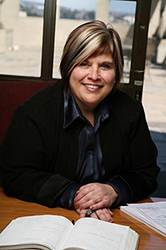New Academic Head at South Campus to expand distance learning programmes into the global arena
“Critical area of focus: Diversify provision, based on open learning principles, to improve learning opportunities across the post-school education and training sector” - SA Department of Higher Education and Training Strategic Plan 2015/16-2019/20 |
Open and distance learning (ODL) programmes will play a critical role in shaping the landscape of higher education. Not only does the South African Department of Higher Education and Training emphasise the importance of ODL, it is also contained within the United Nations’ Sustainable Development Goals. And now the University of the Free State (UFS) is becoming a major role player in the field through the cutting-edge ODL programmes offered by the South Campus.

Jean Grundling has recently been appointed as the Academic Head of the South Campus. |
At the helm of these programmes is the recently-appointed Academic Head of the South Campus: Jean Grundling. According to the new organisational structure of the South Campus, the Academic Head reports directly to the Campus Principal: Dr Daniella Coetzee.
“My role,” says Grundling, “focuses on developing and monitoring processes that will enable effective and efficient implementation of the three pillars of ODL.” These three pillars consist of:
• the design and development of quality learner-centred learning materials and tools during their ODL journeys;
• the selection, appointment, and development of competent facilitators to guide, coach, tutor, and support students; and
• the integration of administrative processes that will enable and support students to study at their own pace, place, and in their own time.
“Goal 4: Ensure inclusive and equitable quality education, and promote lifelong learning opportunities for all.”
United Nations Sustainable Development Goals |
As part of her personal vision, Grundling would like to see the South Campus grow and develop into an institution that offers quality ODL programmes not only nationally, but globally. “I would like the South Campus to become an agent of social transformation in South Africa.”
Ultimately, Grundling’s wish is for the South Campus to contribute to the development and empowerment of people so that they can play a positive role in society.